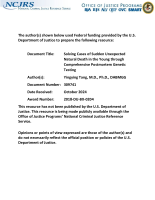Medical examiners
Postmortem CT Scans Supplement and Replace Full Autopsies
MDI Myth: Nobody Cares About or Uses MDI Data
Just Science Podcast: Just Rapidly Identifying Drugs Involved in Suspected Overdoses
Stage Transitions in Lucilia sericata and Phormia regina (Diptera: Calliphoridae) and Implications for Forensic Science
Advancing Justice for the Missing and Unidentified Through Research - 2024 NIJ Research Conference
Forensic science research is developing essential knowledge to fill in the holes in death investigations, creating new ways to identify challenging skeletal remains. These methods inform cause of death, time of death, and familial relationships to guide investigations, identify suspects, support prosecutions, and bring justice to families.
See the YouTube Terms of Service and Google Privacy Policy
Cardiac Genetic Test Yields and Genotype-phenotype Correlations from Large Cohort Investigated by Medical Examiner's Office
The Impact of Processing and Sampling Procedures on the Integrity of Forensically Relevant Biomolecules in Bones
Harnessing Artificial Intelligence to Evaluate Microscopic Characteristics of Skeletal Trauma
A National Review of Multidisciplinary Teams addressing Child Sexual Exploitation
MDI Myth: Rapid Toxicology Screening Tools Can Replace Traditional Toxicology Testing – No Need to Confirm
Technology Use Among the Nation’s Medical Examiner and Coroner Offices: Data from the 2018 Census of Medical Examiner and Coroner Offices
The Impacts of Governing Agency: A Comparison of Resources in the Patchwork of Medicolegal Death Investigation Systems
Just Science Podcast: Just Improving Forensic Toxicology Testing In DC
New Screening Method to Detect Drugs and Poisons Postmortem
New Screening Method to Detect Drugs and Poisons Postmortem
The Miami-Dade medical examiner’s office has developed a quick method to screen fluids for hundreds of drugs simultaneously, improving workflow.
Medetomidine Rapidly Proliferating Across USA — Implicated In Recreational Opioid Drug Supply & Causing Overdose Outbreaks
Navigating Medical Examiner And Coroner Office Accreditation Challenges: A Practical Guide
The Daunting Task of Strengthening Medical Examiner and Coroner Investigations Across Hundreds of Jurisdictions
Webinar Transcript: NIJ FY 24 Research and Evaluation on the Impact of Technologies for Forensic Science Applications
This webinar provided information about the "FY 24 Research and Evaluation on the Impact of Technologies for Forensic Science Applications" solicitation. NIJ seeks applications for funding for proposals to study how adopted technologies with a forensic science application impact criminal justice systems, how the implementation of forensic laboratory...




